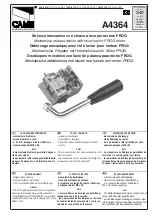
BarbLock® Assembly Tool: Operations Manual
www.biopharm.saint-gobain.com
8
FLS-5278C-CLWR-Rev 01
6.0 Jaw Installation and Removal
WARNING – Pinch Hazard
Jaw Installation and Removal - disconnect the air supply before installing or removing the jaws. Failure to discon-
nect the air supply could result in unexpected closing of the jaws which could cause pinching injuries to fingers.
It could also cause damage to the Assembly Tool. The user is to make certain that the jaws are fully seated in their
respective carriers before re-attaching the air supply and actuating the Assembly Tool by depressing the trigger.
Lower Jaw with “B”
part number suffix
Figure 13: Lower Jaw in rotated position, for entry or removaL from Lower Jaw Carrier.
Upper Jaw not present in this image.
Jaw tail
Figure 14: Example of Upper Jaw, showing part number with suffix letter “A” to indicate upper position.
Jaws are installed in their respective carriers (“A” suffix on the Jaw part number for the upper position, and “B” suf-
fix on the Jaw part number for the lower position) by approaching the carrier with the “tail” of the jaw leading the
approach and with the jaw at an angle of roughly 30° (see figure 13). After the “tail” has entered the locking slot in
the carrier, the jaw is rotated into the carrier seat (parallel with carrier). The jaw will snap into place when it is
correctly loaded. It is not possible to load the jaw backwards, nor is it possible to put the jaw into the wrong carrier.
Snapping the jaw into place requires only moderate force exerted by the fingers. Removal of the jaws begins with
pushing on the two “ears” to disengage the detent (figure 12). The jaw is then rotated and lifted out of the carrier.






































